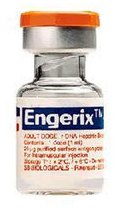Hepatitis B vaccine
What is hepatitis B?
Hepatitis B is a disease, caused by the hepatitis B virus (HBV). The virus affects the liver. The disease can lead to the following complications:
- Continuous infection;
- Cirrhosis liver;
- Liver cancer;
- Hepatic failure;
- Death.
HBV is transmitted through blood or other body fluids of an infected person.
Some factors, that increase the risk of developing hepatitis B:
- Having sex with a person, infected with hepatitis B virus;
- Having multiple sexual partners;
- Injecting drug use;
- Homosexual sex;
- Life or contact person, patients with chronic hepatitis B;
- Contact with infected human blood;
- The presence of hemophilia;
- Travel to places, where hepatitis B is common (Southeast Asia, Africa, the Amazon Basin in South America, Pacific Islands, Near East).
About 30% people with hepatitis B have no symptoms. The remaining symptoms may include:
- Yellowing of the skin and eyes (jaundice);
- Fatigue, lasting several weeks or even months;
- Abdominal pain in the liver area (top right);
- Loss of appetite;
- Nausea;
- Vomiting;
- Joint pain;
- Low-grade fever;
- Dark urine and light stools;
- Itching in many parts of the body;
- Rash.
Symptoms usually appear in about 12 weeks after infection. Generally, they may occur in the area 9-21 weeks after infection. Most cases of hepatitis B runs for 1-2 months without treatment. But when an infection lasts more than six months, it can develop into chronic hepatitis B and lead to serious complications and even death.
Chronic hepatitis B can be treated with antiviral drugs.
What is the hepatitis B vaccine?
Hepatitis B vaccine is produced by introducing a gene for HBV into yeast. Yeast grown, collect, and purified by. The vaccine is administered by injection into the muscle.

Who and when to be vaccinated against hepatitis B?
Children
Infants usually receive the first dose of hepatitis B vaccine before leaving the hospital. If the mother is infected with a virus, vaccine is administered for 12 hours after birth. The next two injections given at age:
- 1-2 months;
- 6-18 months.
Depending on the type of vaccine, some children may get 4 dose.
Children and adolescents (aged 18 years and younger), who were not vaccinated, can also be vaccinated. For children 11-15 years, vaccination is carried out with a vaccine Recombivax HB.
Adult
Adults (aged 18 and older) recommended vaccination, if they have a high risk of developing hepatitis B. High-risk factors include:
- Having multiple sexual partners;
- Treatment of sexually transmitted diseases (STD);
- Homosexual sex;
- Injection drugs at the moment or in the past;
- The presence of chronic kidney disease, liver disease, or HIV;
- Dialysis;
- The presence of diabetes (aged 60 years);
- Work in dangerous proximity to the virus (eg, work in research laboratories, Prisons);
- Working or living in institutions for the mentally retarded;
- Life or contact person, patients with chronic hepatitis B;
- A trip to the regions, where there is a high rate of infection with hepatitis B virus.
Risks, associated with the vaccine against hepatitis in
All vaccines can cause serious problems, such as heavy allergic reactions.
Most people, receiving a vaccine against hepatitis B does not have any problems. Some may have mild problems, including, tenderness at the injection site and fever.
Sometimes Paracetamol, to reduce pain and fever, which may occur after vaccination. In children, the medicine may weaken the effectiveness of the vaccine. It should discuss the risks and benefits, associated with the use of paracetamol with a doctor.
Who should not be vaccinated against hepatitis B?
They should not be vaccinated in the following cases:
- If you have a life-threatening allergic reaction to baker's yeast or to a previous dose of hepatitis B vaccine;
- Strong or moderate disease (vaccination should be carried out after recovery).
What are the ways to prevent hepatitis B vaccination in addition?
In addition to the hepatitis B vaccination, the best methods of preventing hepatitis include:
- Practice safe sex;
- Blood tests for hepatitis B in pregnancy;
- Avoiding drugs;
- You can not use other people's personal hygiene items, which may remain blood (eg, Shaver, toothbrushes);
- It is necessary to take into account the degree of risk, Before getting a tattoo or piercing;
- It is necessary to observe safety precautions when working with needles and other sharp objects.
What happens in the event of an outbreak of hepatitis B?
In the event of an outbreak all susceptible to hepatitis people should be vaccinated.
